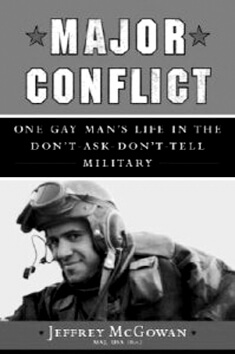New Paltz marriage activist recounts his closeted years in Army combat
In February 2004, Jeffrey McGowan and Billiam van Roestenberg, a gay couple living in upstate New Paltz, were part of the first group of same-sex couples to be married by Mayor Jason West in his bid to emulate San Francisco Mayor Gavin Newsom and defy the anti-marriage forces massed against gay equality.
Perhaps some who read about the ceremony noted the fleeting mention that McGowan was a retired Army officer, but few could guess at the extraordinary story he would have to tell about his military experience, including service in Iraq during the first Gulf War in 1991.
“Major Conflict: One Gay Man’s Life in the Don’t Ask, Don’t Tell Military” is McGowan’s coming-out story, and in many ways it resembles countless other coming-out stories, the classic gay non-fiction literary form. McGowan is not the first gay youngster to seek a career in the armed forces, sublimating his sexuality as much as possible in pursuit of that goal, and finally finding he could go no further. Many others, from Leonard Matlovitch onward, have been down that path and have written about their experiences with eloquence and insight.
McGowan’s version of the story makes a major contribution, however, by providing insight into the effect of the Don’t Ask, Don’t Tell policy, implemented in 1993 while he was in active service at the relatively high rank of captain, soon to be promoted to major. In addition, of course, his account of service in the first Gulf war was fascinating in its own right in providing the additional perspective of a line officer experiencing, as a closeted gay man, the same kind of close bonding with his unit that Pentagon spokespersons continue say would be disrupted if the ban on openly gay soldiers serving were ended.
The major conflict of McGowan’s title is the internal conflict he experienced through a lengthy process of working through his feelings about his sexuality. Growing up in Queens, attending Catholic schools, including Fordham University, enrolling and excelling in ROTC and officer training school, McGowan was, initially posted as a lieutenant to an American base in Germany. He struggled with how one could reconcile a gay identity with a military one.
He first edged out of the closet during the transition from high school to college when he developed a crush on a fellow employee at a midtown Manhattan bookstore, forming a close relationship that included some sex, but from which he drew back, having erected a psychological barrier against full acceptance of a gay identity when he felt his military career dreams threatened.
McGowan was tempted again during his German posting, first with some one-night stands with civilians, then when he developed a passion for a male officer from another unit. Both of them were shipped out to Iraq before the relationship could progress significantly. McGowan’s description of his feelings for this man, similarly to his description of the earlier infatuation, is vivid and engaging.
After his service in Iraq, McGowan returned to the U.S. where he began to ascend the Army officer ranks as he realized his dream to be admitted to an elite paratrooper unit. But with higher rank came more personnel responsibility, including what was apparently his first involvement as a commander with an investigation into a soldier in his command who was suspected of being gay. McGowan courageously stood up to the investigators and shielded the soldier, against whom there was no solid evidence of violating the “don’t tell” part of the policy, at considerable risk to himself under the circumstances.
At some point McGowan could no longer reconcile his continued service with the need to keep his own identity secret, yearning for a life free of masquerading and lies, and decided to leave the Army, becoming one of many such losses of trained and experienced officers who could have played a useful role in the second Gulf War had they not cut their military careers prematurely short.
McGowan’s account is very well written, introspective without being maudlin and at times quite suspenseful and entertaining. He includes some vignettes of Army life that are laugh-out-loud funny, and others that are terrifying. Most importantly, he provides first hand testimony about the futility and counter-productiveness of the current policy on gay military service.
McGowan’s story, and those of countless others like him, need to be widely disseminated to the American people to support the continuing efforts to get Congress to repeal a policy that has always been harmful to our national security.
gaycitynews.com



































